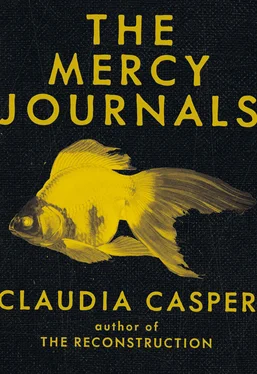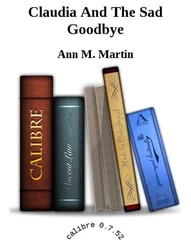Allen Quincy, Allen Quincy,
Don’t be chintzy
Drop your martyr
Join the partyr!
My mind started to thrash about inside my skull, trying to find any excuse not to accept. It was a nice invitation, and I didn’t want to be rude.
I’m working very early in the morning, I said lamely. I need my sleep. The worms dropped their heads, crushed with disappointment, and nodded. I was scared. I’d met those worms before, but not for a long time, not for twenty years, not since I was sober. I thought they’d be back; they’re persistent little buggers. I wasn’t sure I could hold them off this time.
I raced home, too alarmed now to try a pill. I flushed all four down the toilet, got my 9mm out of the closet, loaded it, put the safety on, and careened around my apartment, chilled with sweat, weeping, moaning, pressing against the walls. I sank to the floor on the cracked linoleum of the kitchenette, the Cracked Linoleum Trials of Allen Quincy, and cracked. My heart can live with what’s in my mind — the heart is a cold and calculating organ — but my mind can’t.
I couldn’t bear another minute in my head, let alone the rest of my life. Like a man drowning I wrenched my mobile off its dock on the generator and croaked the words, obliteration, memory. The search engine spewed out useless entries: Hacktivists Breach Secret Service Servers, Buddhas of Bamiyan, Damnatio memoriae, Save Our Libraries, Harry Potter’s obliteration charm. I voiced, mind-control, amnesia — the results were equally useless. I cried out, forget and scanned the first ten items: forget-me-nots, Lest We Forget, Forget about Location, Location, Location, etc. I scanned the next fifty. At sixty-one I almost smashed my mobile against the wall and obliterated it. I gargled out the words destruction of memory and there, item thirty-two, after Sands of Destruction GameFaqs, Take Back Our Cultural Memory, Orwell’s 1984, and Alzheimer’s, the words popped out: “Writing destroys memory.”
I felt in that instant that I had just read my possible salvation.
I clicked on the link and sank onto a kitchen chair.
Psycholinguistics scholar Marjan Rohani of Oxford University, in her work on long-term memory, language, and the hyper-connectivity of the internet, re-examines the implications of the assertion by ancient-Greek philosopher Socrates (as reported by Plato) that the process of writing weakens the mind. “It will implant forgetfulness in [men’s] souls; they will cease to exercise memory because they rely on that which is written, calling things to remembrance no longer from within themselves, but by means of external marks.” (Phaedrus, Plato)
Oh, for such a weakened mind! I poured a giant whiskey and water, downed it, put the Beretta down on the counter, and voiced the first entry into my mobile. Why wait? I’m not nostalgic.
My name is Allen Levy Quincy. Age 58 …
I finished the bottle and blacked out.
This morning nothing seems clear. It’s as though a clumsy acupuncturist was probing my brain all night trying to activate some kind of release. It hurts, but there’s no pain. I text in sick to work — the second time in seventeen years — and stare out the window at a skateboarder on the parking lot roof across the street. His cardigan blows open as he spirals down the interior ramp and pops out into the street, does a quick kick flip off the sidewalk, and disappears. The world right now — skater heaven. I try to eat a heel of bread, but the smell of the yeast turns my stomach.
How to proceed? This morning it’s clear that the words writing destroys memory do not mean what they say. How could writing destroy memory? Socrates was indulging in hyperbole. I searched up more about him. He was indignant because the new technology of writing was making students less interested in memorizing poems, speeches, and information and thus weakening their ability to memorize. But memorization is not my problem. The memories that threaten my survival are bolted into the very tissue of my brain. Writing is not going to destroy them.
Patience, Quincy, patience.
There’s something there. Something in the writing.
Approach your destroying angels one word at a time.
I’ll approach with caution. If I go at my memories directly I’ll never survive. I will take the longer road and lay an ambush. I will describe my world. I will tell you about Ruby.
I am creating this document because of her.
Spark to dynamite, grit in oyster, cutter of hair, Eve, Pandora, agitator, gestator of mystery, fomenter of change. Ruby.
There was blood on her teeth when she last walked out the door and gave me a look I am still trying to understand. That was over a week ago, when my old strategy for survival finally imploded.
Eighteen years ago I had also been this desperate. I was on antidepressants, going to group therapy, talk therapy, gaming obsessively online, drinking to blackout — nothing helped enough. The army shrink, a pleasant, amoral, over-worked man, told us that repressing the traumatic memories would not work, but obsessively rehearsing them was also damaging — wearing a groove in our brains, so to speak. One day he told us to write Impact Statements. He said we had to find a way to let ourselves off the hook. I walked out the door and never went back. The worms had arrived by then and were popping up randomly to serenade me. Suicide was folding back her sheets and giving me the come hither in an inventive variety of poses.
Then too I’d voiced variations on “forgetting” into the search engine, and the results had been equally useless. Finally I’d tried “remembering,” and had landed on an article from the early twenty-first century when governments still funded research not related to immediate survival. The article explained how neuroscientists had discovered that the ability to remember important things depended on the simultaneous ability to block out or forget unimportant details. Since my need was to block memories that were already lodged deep in my brain, I decided to build an anti-mnemonic firewall by jamming my mind full of unimportant details. It took months, it took discipline, it took abandoning my military career for the job of parking-enforcement officer, it took quitting booze, it took the end of my marriage, cutting off friends, and reducing the already uneasy connection with my sons to an even more reserved and distant one. I shrank my life to an existence so small nothing important could penetrate. In the end I don’t know if it was the pure, uncontaminated banality of my life, or the controlled, predictable, tiny scope of it that did the trick, but I got relief.
I went to work. Came home. Good citizen. I lived within my rations and fined those who overstepped theirs. Over time, my shrunken life evolved into a kind of monk’s existence minus the religion, but you could have also said — it would be ironic but true — that I lived the life of a hedonist. A celibate hedonist. Nothing like my brother’s pleasures before the die-off — the yacht, fast cars, waterfront mansion, and five-star vacations. I was a low-end hedonist. I had no dissatisfaction. I wasn’t frustrated about anything. I wasn’t fixing anything. I was neither building nor destroying. My desires were simple and I was satisfied in satisfying them. Pleasure filled my life.
At night I looked forward to the task of threading my hands and my foot past small tears in the pyjamas I’d had since Jennifer and I split. They’d been laundered to the thickness of gauze. I took pleasure in the feel of my shabby flannel sheets against the skin of my ankles and in the reflected heat from the duck feathers in my duvet. Mornings I watched the eruption of goosebumps on my forearms as my skin re-entered the bracing, damp world. I relished tannin from my tea coating the back of my tongue and watery porridge absorbing the acids in my stomach. I fed my fish and was in awe at these slivers of flashing light in my dun apartment. Even the tiny bubbles that appeared in the sponge when I washed my dishes and the shiny patina of my bowl after I dried it were mesmerizingly beautiful. I liked the way my foot fit into the mould of my boot, and I admired the grey, velvety, thin dawn outside my window. My first step out into the street, always a thrill, marked the daily re-entry into a world animated by jittery, soft shadows and continuous breezes. Even my brain, scarred as it is, gave some pleasure remembering what I’d read the night before or tossing up an image of my sons’ slender, hairless arms throwing stones into the sea.
Читать дальше












